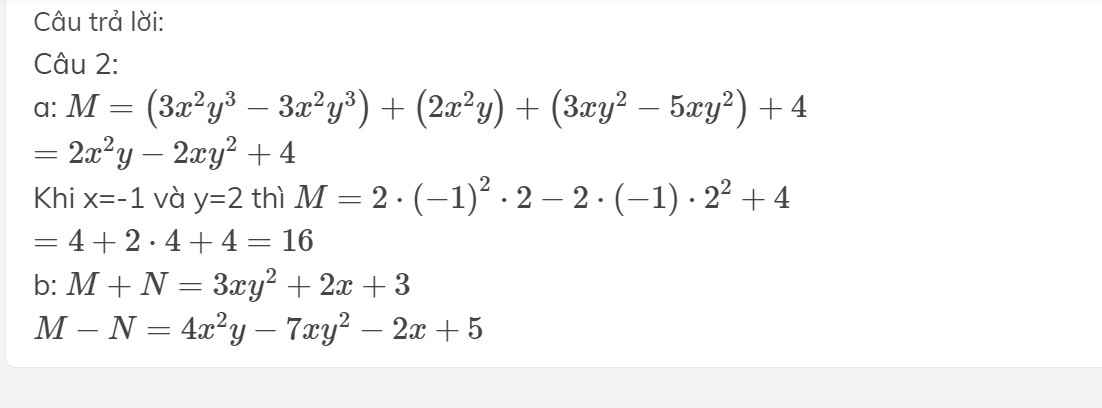Hãy nhập câu hỏi của bạn vào đây, nếu là tài khoản VIP, bạn sẽ được ưu tiên trả lời.

(4x3 + 2x2 − 1) − (4x3 − x2 + 1)
= 4x3 + 2x2 – 1 – 4x3 + x2 – 1
= (4x3 – 4x3) + (2x2 + x2 ) – (1+ 1)
= 3x2 – 2
Chọn đáp án C

`#Namnam041005`
`a)`
`A(x) =`\(x^5+ x^3- 4x - x^5 + 3x - x^2 + 7\)
`= (x^5 - x^5) + x^3 - x^2 + (-4x + 3x) + 7`
`= x^3 - x^2 - x + 7`
`B(x) = `\(3x^2 - x^5 + 5x - 2x^2 - 9\)
`= (3x^2 - 2x^2) - x^5 + 5x - 9`
`= -x^5 + x^2 + 5x - 9`
`b)`
`A(x)``= x^3 - x^2 - x + 7`
Bậc của đa thức: `3`
Hệ số cao nhất: `1`
Hệ số tự do: `7`
`c)`
`A(x) + B(x) = x^3 - x^2 - x + 7 -x^5 + x^2 + 5x - 9`
`= -x^5 + x^3 + (-x^2 + x^2) + (-x+5x) + (7-9)`
`= -x^5 + x^3 + 4x - 2`
`A(x) - B(x) = x^3 - x^2 - x + 7 - (-x^5 + x^2 + 5x - 9)`
`= x^3 - x^2 - x + 7 +x^5 - x^2 - 5x + 9`
`= x^5 + x^3 + (-x^2 - x^2) + (-x-5x) + (7+9)`
`= x^5 + x^3 - 2x^2 - 6x + 16`
___
`A(x) + B(x) = -x^5 + x^3 + 4x - 2=0`
Bạn xem lại đề
`d)`
`H(x) - B(x) = x^3 + x^2 - x + 1`
`=> H(x) = (x^3 + x^2 - x + 1) + B(x)`
`=> H(x) = x^3 + x^2 - x + 1 -x^5 + x^2 + 5x - 9`
`= -x^5 + x^3 + (x^2 + x^2) + (-x+5x) + (1 - 9)`
`= -x^5 + x^3 + 2x^2 + 4x - 8`
a: A(x)=x^5-x^5+x^3-x^2-4x+3x+7
=x^3-x^2-x+7
B(x)=-x^5+3x^2-2x^2+5x-9
=-x^5+x^2+5x-9
b: Bậc: 3
Hệ số cao nhất: 1
hệ số tự do: 7
c: A(x)+B(x)
=x^3-x^2-x+7-x^5+x^2+5x-9
=-x^5+x^3+4x-2
A(x)-B(x)
=x^3-x^2-x+7+x^5-x^2-5x+9
=x^5+x^3-2x^2-6x+16
d: H(x)=x^3+x^2-x+1+B(x)
=x^3+x^2-x+1-x^5+x^2+5x-9
=-x^5+x^3+2x^2+4x-8

\(a)A\left(x\right)=5+3x^2-x-2x^2\)
\(A\left(x\right)=\left(3x^2-2x^2\right)-x+5\)
\(A\left(x\right)=x^2-x+5\)
\(B\left(x\right)=3x+3-x-x^2\)
\(B\left(x\right)=-x^2+\left(3x-x\right)+3\)
\(B\left(x\right)=-x^2+2x+3\)
\(b)C\left(x\right)=A\left(x\right)+B\left(x\right)\)
\(C\left(x\right)=\left(x^2-x+5\right)+\left(-x^2+2x+3\right)\)
\(C\left(x\right)=x^2-x+5+-x^2+2x+3\)
\(C\left(x\right)=\left(x^2-x^2\right)+\left(-x+2x\right)+\left(5+3\right)\)
\(C\left(x\right)=-x+8\)
\(c)D\left(x\right)=A\left(x\right)-B\left(x\right)\)
\(D\left(x\right)=\left(x^2-x+5\right)-\left(-x^2+2x+3\right)\)
\(D\left(x\right)=x^2-x+5+x^2-2x-3\)
\(D\left(x\right)=\left(x^2+x^2\right)+\left(-x-2x\right)+\left(5-3\right)\)
\(D\left(x\right)=2x^2-3x+2\)

a) \(A\left(x\right)=5+3x^2-x-2x^2\)
\(A\left(x\right)=5+\left(3x^2-2x^2\right)-x\)
\(A\left(x\right)=5+x^2-x\)
\(A\left(x\right)=x^2-x+5\)
\(B\left(x\right)=3x+3-x-x^2\)
\(B\left(x\right)=\left(3x-x\right)+3-x^2\)
\(B\left(x\right)=2x+3-x^2\)
\(B\left(x\right)=-x^2+2x+3\)
b) Ta có \(C\left(x\right)=A\left(x\right)+B\left(x\right)\)
\(\begin{matrix}\Rightarrow A\left(x\right)=x^2-x+5\\^+B\left(x\right)=-x^2+2x+3\\\overline{A\left(x\right)+B\left(x\right)=0+x+8}\end{matrix}\)
Vậy \(C\left(x\right)=x+8\)
c) Ta có \(D\left(x\right)=A\left(x\right)-B\left(x\right)\)
\(\begin{matrix}\Rightarrow A\left(x\right)=x^2-x+5\\^-B\left(x\right)=-x^2+2x+3\\\overline{A\left(x\right)-B\left(x\right)=2x^2-3x+2}\end{matrix}\)
Vậy \(D\left(x\right)=2x^2-3x+2\)
Ở câu b, \(A\left(x\right)+B\left(x\right)=0+x+8\) số 0 bạn bỏ rồi để khoảng trống \(A\left(x\right)+B\left(x\right)=\) \(x+8\) như vậy nha, với các dấu \(=\) ở câu b và c với cái số bạn đặt thẳng hàng nha (các từ in đậm bạn không cần ghi)

a) 2x(x+3) – 3x2(x+2) + x(3x2 + 4x – 6)
= (2x . x + 2x . 3) – (3x2 . x + 3x2 . 2) + (x . 3x2 + x . 4x – x . 6)
= 2x2 + 6x – (3x3 + 6x2) + (3x3 + 4x2 - 6x)
= 2x2 + 6x – 3x3 – 6x2 + 3x3 + 4x2 - 6x
= (– 3x3 + 3x3 ) + (2x2 - 6x2 + 4x2 ) + (6x – 6x)
= 0 + 0 + 0
= 0
b) 3x(2x2 – x) – 2x2(3x+1) + 5(x2 – 1)
= [3x . 2x2 + 3x . (-x)] – (2x2 . 3x + 2x2 . 1) + [5x2 + 5 . (-1)]
= 6x3 – 3x2 – (6x3 +2x2) + 5x2 – 5
= 6x3 – 3x2 – 6x3 - 2x2 + 5x2 – 5
= (6x3 – 6x3 ) + (-3x2 – 2x2 + 5x2) – 5
= 0 + 0 – 5
= - 5

Bài 4:
b: \(=x^2z\left(-1+3-7\right)=-5x^2z=-5\cdot\left(-1\right)^2\cdot\left(-2\right)=10\)
c: \(=xy^2\left(5+0.5-3\right)=2.5xy^2=2.5\cdot2\cdot1^2=5\)

\(a,A\left(x\right)=-3x^3+2x^2-6+5x+4x^3-2x^2-4-4x\\ =\left(-3x^3+4x^3\right)+\left(2x^2-2x^2\right)+\left(5x-4x\right)+\left(-6-4\right)\\ =x^3+0+x-10\\ =x^3+x-10\)
Bậc của đa thức : \(3\)
Hệ số cao nhất ứng với hệ số của số mũ cao nhất : \(1\)
b, \(B\left(x\right)=A\left(x\right).\left(x-1\right)\\ =\left(x^3+x-10\right)\left(x-1\right)\\ =x^3.x+x.x-10x-x^3-x+10\\ =x^4+x^2-x^3-10x-x+10\\ =x^4-x^3+x^2-11x+10\)
\(B\left(2\right)=2^4-2^3+2^2-11.2+10=0\)

a, \(a\left(b+c\right)-b\left(a+c\right)-c\left(b-a\right)\)
\(=ab+ac-ba-bc-cb+ac\)
\(=2ac-2bc\)
b, \(\left(-3x^2\right)\left(2x^2+4x-\frac{1}{2}\right)=-6x^4-12x^3+\frac{3}{2}x^2\)
a)
\(a\left(b+c\right)-b\left(c+a\right)-c\left(b-a\right)\)
\(=ab+ac-bc-ab-bc+ac\)
\(=2\left(ac-bc\right)\)
Vậy \(A=2\left(ac-bc\right)\)